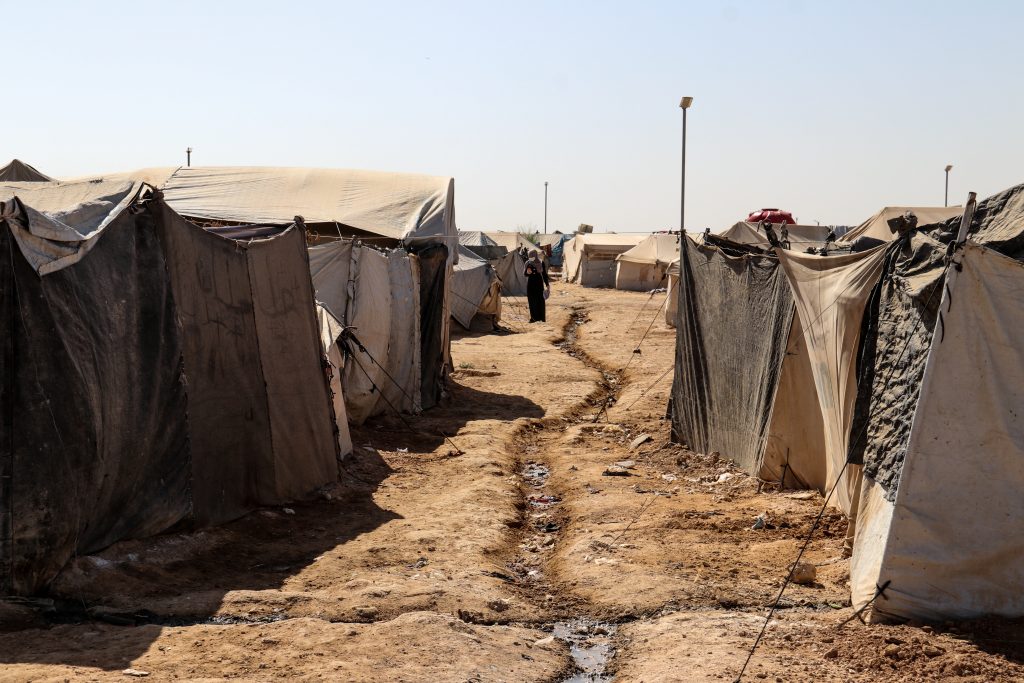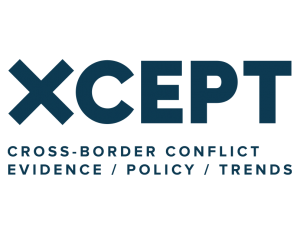By Joana Cook
*In November 2022, the newly formed government of Iraq suspended repatriations of Iraqi nationals from al-Hol camp. It is not clear if or when these repatriations will be resumed.
Between May 2021 and January 2022, the Iraqi government repatriated nearly five hundred Iraqi families from al-Hol camp in northeast Syria via the Jeddah 1 rehabilitation centre in Iraq. Some 86% of these returnees were under the age of 18. Thus began the admirable government-led efforts to start returning home some of the approximately thirty thousand Iraqis who comprise roughly half the residents of al-Hol camp – the camp infamous for housing many of the local and international Islamic State (IS)-affiliated families and supporters who were detained by the SDF and held after the territorial defeat of the group in 2019.

Photo: al-Hol camp in Syria. Credit: Trent Inness/Shutterstock.
For Iraqis, the task ahead is complex for several reasons. First, this group of Iraqis largely comprises women and children, meaning age and gender must be taken into account at every step of the return process, longer-term rehabilitation and reintegration. For the purposes of this piece, I will focus on the needs of children, though those of the women detained deserve greater attention as well. Second, the communities these Iraqis are returning to were heavily impacted by IS governance and violence. Consequently, the Iraqi government must balance local needs and grievances with reintegration imperatives. Third, as IS focused on establishing a governance project, children became involved and impacted in various ways. For many years, the children under IS rule lived at the centre of a major international conflict – from 2014, local forces on the ground were supported by the US-led coalition, eventually defeating IS in early 2017 in Iraq, and next door in Baghouz, Syria in 2019. Those whose families were affiliated with IS risk being viewed as collectively guilty for the sins of their fathers, especially in the case of male children. Others who were born in IS territory and issued IS documentation such as birth certificates are currently prevented from attending schools in Iraq due to a ‘lack of documentation’, as IS documents are not recognised by the Iraqi government. As such, depending on their age and experiences under the caliphate, these children present a diverse and complex range of needs and profiles.
This article will briefly discuss the experience of Iraqi children who lived under IS. It will then consider their additional experiences in al-Hol camp and highlight several considerations that will be important for their successful return and integration eight years after IS first took control of an area the size of Britain across Iraq and Syria.
Children and life under IS
During the years IS controlled territory throughout Iraq and Syria, children were impacted in diverse ways. It is claimed that tens of thousands attended IS-led schools (if they were even able to attend school), where instead of normal subjects, they were exposed to an IS curriculum and indoctrination. In many cases, as the conflict progressed, many children simply could not receive any education at all and today face significant gaps in educational attainment, literacy and, in the case of older youth, vocational skills. In some cases, military training or becoming child soldiers was the route for young boys, causing significant psychosocial impacts and implications. In the case of young girls, many became child brides and married IS fighters or supporters. Others were imbued with the gendered ideology of the group and faced uniquely gendered experiences.
Children were exposed to IS violence and life in a conflict zone more broadly, as regional forces supported by an international coalition pushed back IS. For the thousands of children born between 2014 in this period, many may have not yet experienced ‘normal’ life and face additional challenges related to personal documentation (for example, birth certificates, as noted above), which further impact their prospects and access to government support and successful reintegration.
Children in al-Hol camp
While some aspects of life improved for children when many of these families were moved to al-Hol camp in 2019 after the defeat of IS in Baghouz, the general instability and violence present in the camp produced new challenges and added to existing ones. Furthermore, children have lacked the long-term support required to deal with the concerns raised from their time under IS, including psychosocial, educational and other types of support.
In al-Hol camp, children have continued to be exposed to violence, including murders and assaults. Almost 500 children died in the camp in 2019 alone; in 2021, two children every week on average were dying. Al-Hol camp also lacks sufficient tailored, child-focused services and long-term plans to support their growth and development. At least 850 boys are also being held in detention settings, impacted by events such as the attack in al-Hasakah prison that saw several boys killed and others taken hostage.
Considerations upon return to Iraq
Clearly, it is imperative for the governments and other actors legally responsible for these children to assess and address the situations they face. The Iraqi government has already taken the first steps by starting to return these persons through the Jeddah 1 rehabilitation centre, at which children can access some services, such as mental health and psychosocial support in the centre.[1] By focusing on the risks, stigmas, and resilience factors related to children of IS-affiliated families, researchers can better identify what may negatively impact these children’s normal lives and development. Such an identification allows for the better targeting of efforts that can reduce the challenges faced by these children on the complex paths ahead.
Beyond the experience of life under IS and the continued concerns around conditions in al-Hol camp, many of these children now face complex psychosocial problems, educational limitations and societal stigmas. Research in other fields that has focused on child soldiers, refugee children, children exposed to war, and children in gangs or cults, among others, can help to inform this work and support rehabilitation and reintegration programming. This could include, for example, specific training and support for those, such as health care workers and educators, caring for and working with these children, or helping children to build social bonds and self confidence through art therapy or sports programmes.
As highlighted by the EU-funded PREPARE project, and recent work by ICCT which I am involved in, it is important to identify and reduce the risks and stigmas children may face when their families are affiliated with terrorist networks, and to also build their resilience factors. Appropriately supported as they grow up, they will be better able to rehabilitate (as necessary) and reintegrate successfully and may be less likely to develop grievances or other challenges associated with these aspects of their life. Some of the potential inter-related implications, whether anti-social behaviour, trauma-related impacts and implications, or increased susceptibility to violent extremist narratives and recruitment, can also be more directly addressed. In turn, this can help to prevent or reduce tensions, and contribute to societal cohesion in communities receiving these families. This could prove to be one of the most fundamental aspects of recovery from conflict in the region. Supporting the rehabilitation and reintegration of children affiliated with IS must be the focus not only of governmental actors but also the research community, which can support this work.
[1] For discussion of services, please see p. 59 of the linked report.

This publication was produced as part of the XCEPT programme, a programme funded by UK International Development from the UK government. The views expressed do not necessarily reflect the UK government’s official policies.

